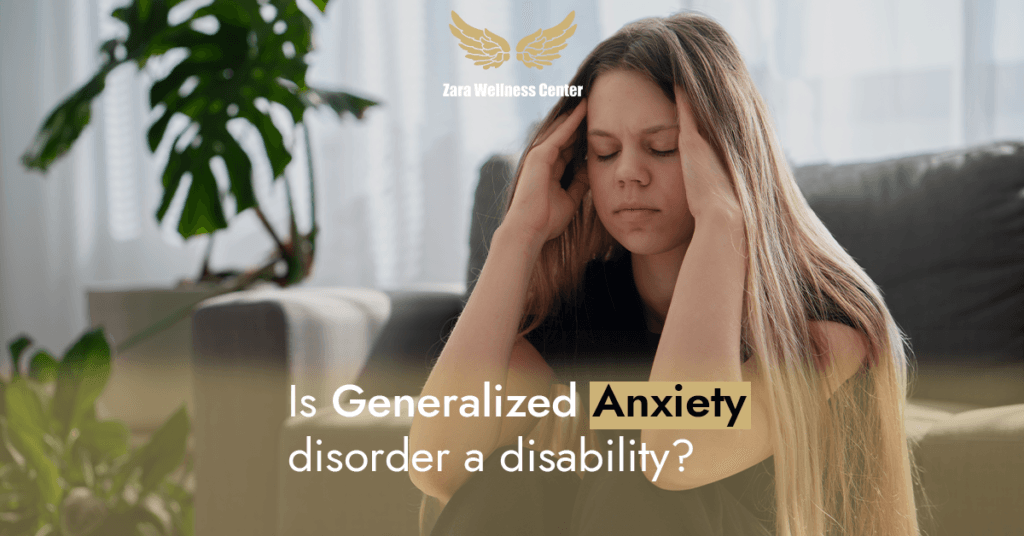The complexities of mental health can be challenging to understand, particularly when it comes to conditions like Generalized Anxiety Disorder (GAD).
Understanding how GAD fits into legal protections and workplace accommodations isn’t always simple.
Whether generalized anxiety disorder is a disability is not just a matter of semantics but an important question.
If GAD severely hampers one or more key life activities, it’s considered a disability.
Determining this involves evaluating how GAD affects a person’s ability to perform essential life functions.
This could mean assessing the impact on work performance, social interactions, and personal care.
What’s Generalized Anxiety Disorder?
Generalized Anxiety Disorder is a mental health issue where a person consistently worries too much about different parts of life like their job, health, or social situations.
This continual anxiety can greatly disrupt daily life, making it hard for people suffering from GAD to focus, finish work, or maintain relationships.
Symptoms of Generalized Anxiety Disorder
- Excessive worrying.
- Restlessness.
- Fatigue.
- Difficulty concentrating.
- Irritability.
- Muscle tension.
- Sleep disturbances.
These symptoms can be debilitating, leading to the question: is generalized anxiety disorder a disability in the context of legal and workplace accommodations?
Legal Perspective: Is Generalized Anxiety Disorder a Disability?
The Definition of Disability
According to the Americans with Disabilities Act (ADA), a disability is a condition that impairs one’s physical or mental state, it It can drastically restrict essential life activities.
Conditions such as Generalized Anxiety Disorder (GAD) are included in this definition if they deeply influence someone’s everyday life.
Is GAD a Disability?
If GAD severely hampers one or more key life activities, it’s considered a disability.
Determining this involves evaluating how GAD affects a person’s ability to perform essential life functions.
This could mean assessing the impact on work performance, social interactions, and personal care.
Disability Ratings and Generalized Anxiety Disorder
Understanding the Disability Rating for Anxiety Disorder
The disability rating for anxiety disorder is an assessment of the disorder’s intensity and its effect on a person’s life.
In the U.S., both the Social Security Administration and the Department of Veterans Affairs use certain standards when checking mental health situations, which involve:
- Frequency and severity of symptoms.
- Impact on daily activities and social interactions.
- Effectiveness of treatment.
Visit the Social Security Administration and the Department of Veterans Affairs for detailed criteria.
Generalized Anxiety Disorder and Disability Benefits
Navigating Generalized Anxiety Disorder and Disability
Applying for disability aid due to GAD calls for a complete knowledge of the steps taken. Generalized anxiety disorder and disability benefits can give vital support.
However, individuals must present complete medical files and proof of how GAD influences their jobs and daily living.
Steps to Apply for Disability Benefits
- Obtain a diagnosis from a qualified mental health professional.
- Gather medical records and documentation of treatment history.
- Demonstrate how GAD impacts your ability to work and perform daily tasks.
- Apply to the appropriate government agency or department.
The Impact of Disability Due to Mental Illness
Challenging Stigma and Accessing Support
Disability due to mental illness, including GAD, can be hard to navigate.
Even though mental health is more recognized in disability claims, stigma and, misconceptions often block support.
Learning and speaking up are key to beating these obstacles.
Workplace Considerations: Anxiety Accommodations
Implementing Effective Anxiety Accommodations
For those with GAD, changes at work can hugely improve performance. Anxiety accommodations may include:
- Flexible work hours.
- Quiet work environments.
- Options for remote work.
- Regular breaks to manage stress.
These changes can be vital for keeping productivity and wellness at work.
Treatment and Management of Generalized Anxiety Disorder
Dealing with Generalized Anxiety Disorder can seem difficult. However, effective treatments and solutions exist.
They can lessen signs of worry and enhance life quality.
- Cognitive Behavioral Therapy (CBT)
Cognitive Behavioral Therapy (CBT), is often used. It’s about shifting negative thoughts and habits. It arms people with methods to handle anxiety better.
- Medication
Medication might also be an option in some cases. It can be used to relieve GAD symptoms. Typical medications are antidepressants and drugs for anxiety.
A healthcare professional should always oversee these.
- Lifestyle Changes and Support
Altering your lifestyle can also matter in managing GAD. Possible changes are:
- Regular workouts.
- Mindfulness.
- Relaxation methods.
- A nutritious diet.
- Plenty of sleep.
Support from loved ones, friends, and mental health experts can give an essential boost.
Handling the hurdles of generalized anxiety disorder becomes easier with them.
How Long Does It Take to Get Over Anxiety?
The recovery time can differ a lot from person to person.
It depends on the severity of the symptoms, the treatment’s success, and the person’s situation.
Some people feel better in a few months, while others might need more time to see notable progress.
Taking the Next Steps
Knowing if generalized anxiety disorder (GAD) is seen as a disability is key. It helps get proper support and accommodations.
If you or someone you know is affected by GAD, seeking professional assistance is a step toward managing the condition and improving the quality of life.
Zara Wellness Center: Here to Support You
At Zara Wellness Center, we care deeply for people dealing with GAD.
We have experts ready to help you down the road to better mental health—contact us today.
Find out how we can help you meet your health and well-being goals.
FAQs
Is generalized anxiety disorder lifelong?
While Generalized Anxiety Disorder (GAD) can persist for some, it doesn’t have to be lifelong. With the right treatment involving therapy and medications, many individuals can control their symptoms well, enjoying fulfilled lives.
Can I get disability with generalized anxiety?
Yes, if your generalized anxiety disorder significantly disrupts your everyday tasks or job, you could qualify for disability benefits. Thorough medical documentation and proof are crucial to back up your claim.
Is generalized anxiety disorder a disability?
If your generalized anxiety disorder severely hampers one or more key life activities, it can be deemed a disability. The severity of symptoms and their effect on everyday tasks play a crucial role.
How serious is generalized anxiety disorder?
GAD, a severe health condition, can impact different life areas like work, socializing, and personal bonds. It’s mostly manageable, but if GAD isn’t treated, it can cause severe health problems. So, getting expert assistance is key.



